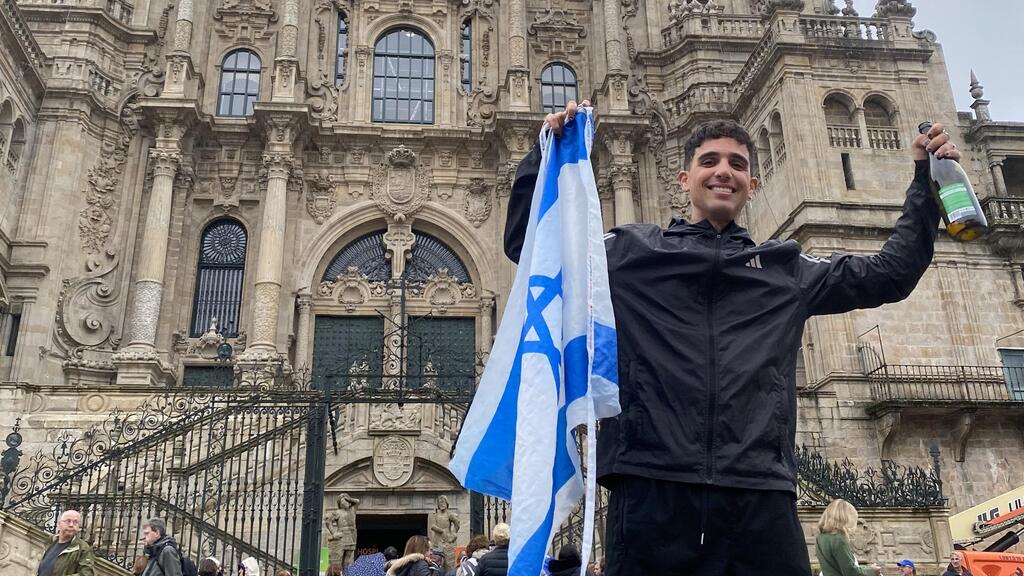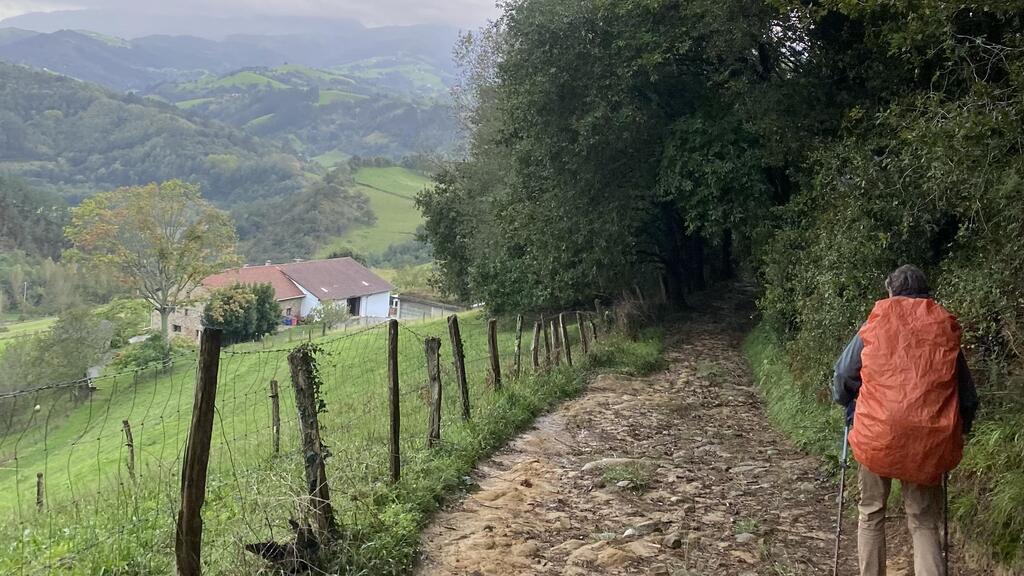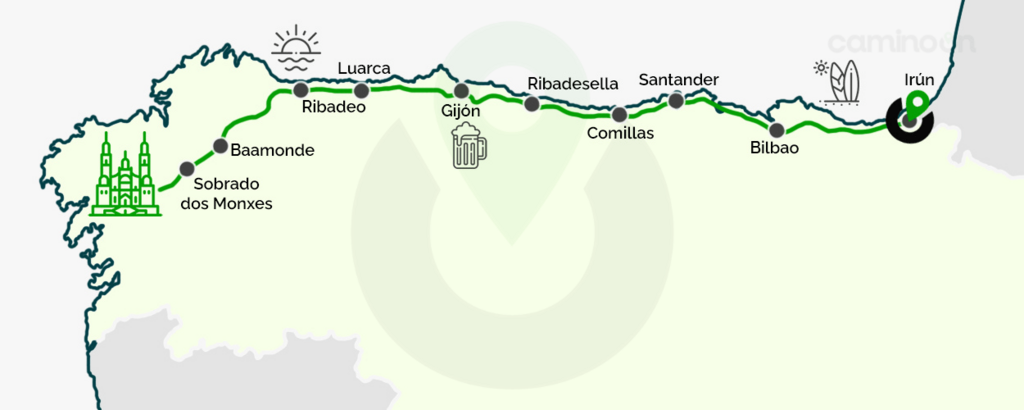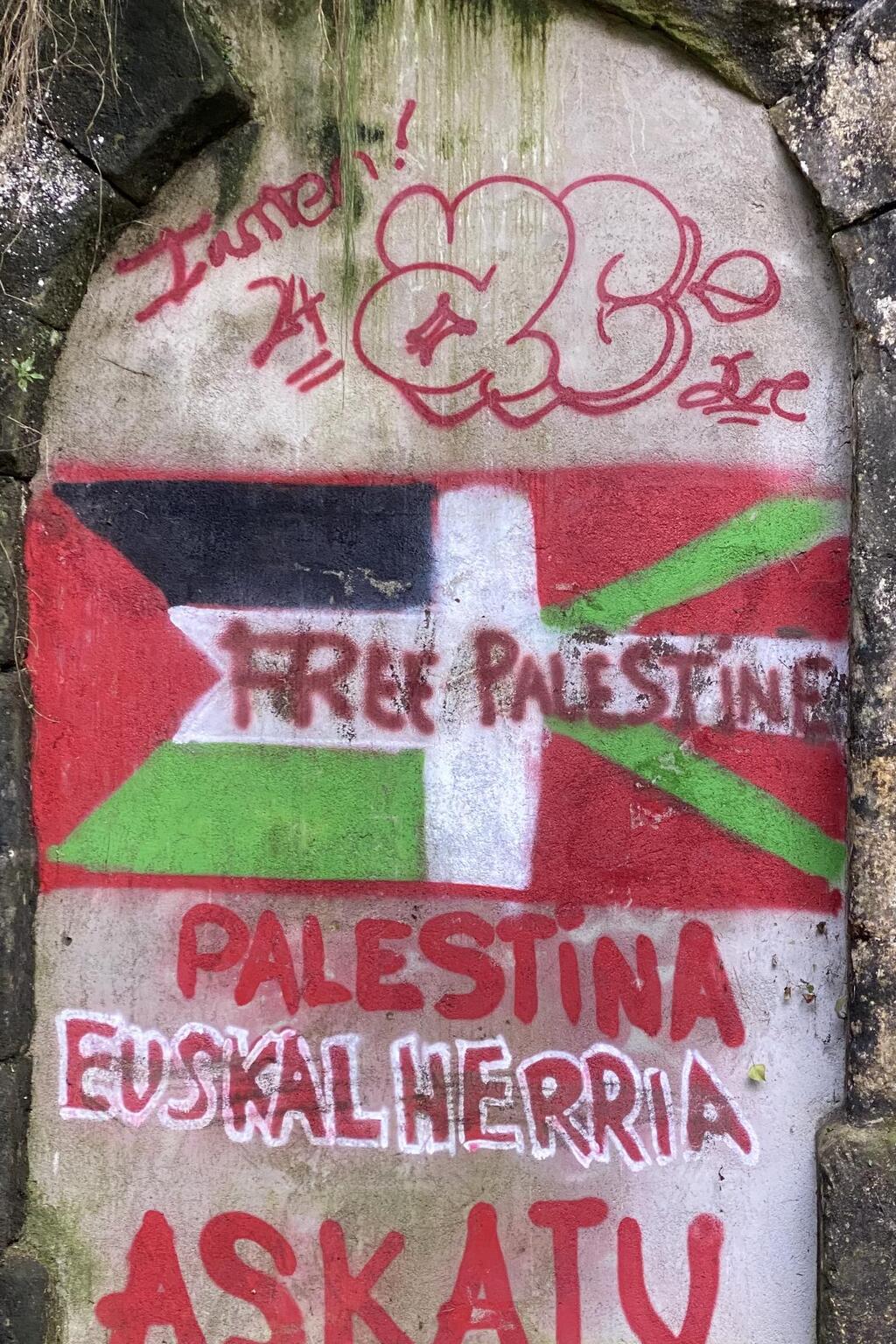Getting your Trinity Audio player ready...
Eliasaf Elyakim, a 25-year-old from Holon, embarked on a challenging solo journey along the 375-mile Camino de Santiago trail in Spain, with an Israeli flag proudly displayed on his backpack. What began as a personal quest for self-discovery soon became a journey of reconnecting with his Jewish identity and confronting the harsh realities of antisemitism in post-October 7 Europe.
The journey culminated in a celebratory moment as Eliasaf stood with the Israeli flag outside the Cathedral of Santiago de Compostela, the final destination of the trail. Reflecting on his experience, he shared with Ynet: "It all started in Naples. I went on a short trip with friends but decided not to return to Israel. I ended up staying in Italy for 70 days—alone. That’s how my solo travels began." Over time, Eliasaf traveled through dozens of European countries, discovering that traveling alone, without needing to accommodate others, provided him with a true sense of independence.
After months of exploring Europe’s green landscapes, Eliasaf, who had not completed full military service due to personal circumstances, found himself in London on the morning of October 7. It was there that he encountered blatant antisemitism for the first time—a traumatic experience that left a lasting impression. "I witnessed levels of hate I had never seen before," he recalled. "People were shouting 'Death to Jews' in the streets and burning Israeli flags. I was shocked by the intensity of the hatred. It shook me to the core. I realized I couldn’t remain silent or hide. London was no longer my home."
Determined to face his fears and pain head-on, Eliasaf decided to fulfill a long-held dream: walking the Camino de Santiago with the Israeli flag. "I felt I couldn’t hide my identity. I knew it would be challenging, but that was exactly the experience I needed."
The Camino de Santiago is an ancient and mystical pilgrimage route, hundreds of years old, that ends in the Spanish city of Santiago de Compostela, where Christian tradition holds that one of Jesus’ disciples is buried. Thousands of travelers from around the world walk the trail each year, pursuing spiritual, religious, or cultural experiences while soaking in breathtaking views and sharing extraordinary human stories.
Eliasaf chose the northern route of the Camino, which follows the Atlantic coastline and begins in the picturesque Basque city of San Sebastián. Known for its stunning beaches and rich culinary culture, this idyllic region was where Eliasaf first encountered severe verbal hostility. "People threw things at me from moving cars, shouted 'Free Palestine,' and made obscene gestures," he shared. "It was hard, but I felt it was pain I had to endure—it was part of my journey to reconnect with my identity. Every antisemitic comment only strengthened my resolve to keep walking with the Israeli flag—the blue and white Star of David—on my backpack."
The northern Camino route takes travelers through breathtaking landscapes of forests, beaches, small villages, and charming towns. Lodging is provided in inexpensive hostels, offering simple accommodations and opportunities for social interaction. Along the way, Eliasaf had emotional encounters with fellow travelers, each carrying their own story of redemption and self-discovery. "I met a retiree who told me his wife had begged him for years to travel with her, but he kept postponing it until retirement. Eventually, he went on the journey alone after she passed away. That touched me deeply. I also met a young man from Canada who was traveling after a mental health crisis. We spent hours discussing life and the struggles we all face."
Surprisingly, the most difficult part of Eliasaf’s journey wasn’t the hostility, loneliness, unpredictable weather, or heavy backpack—it was the blisters on his feet. "Every day, I walked between 12 and 18 miles, constantly replacing bandages," he recalled with a mix of humor and pain. Despite the physical challenges, the journey offered profound moments of reflection. "I realized that true happiness is sharing beautiful moments with loved ones and appreciating the present because life is unpredictable. Sometimes, I would stand before an incredible view and think, 'I wish I could share this moment with someone close to me.'"
One of the most unforgettable moments of the journey occurred during a powerful storm. Eliasaf sought shelter under a tree for an hour before finally arriving at a remote farm owned by a Christian community that studies Hebrew and believes in Jesus. "I found myself speaking Hebrew with them in the middle of nowhere. It was such a surreal and fascinating experience."
A key part of the Camino experience is consciously choosing meaningful stops along the way. One of Eliasaf's favorite destinations on the northern Atlantic route was Gijón. "It’s a magical surfing town with amazing waves and professional surf camps," he said. "You sit on the beach and feel the freedom of the travelers around you. San Sebastián is a culinary paradise with incredible culture and postcard-perfect beaches. Bilbao combines nature, culture, and vibrant nightlife—you can’t miss it. It has museums like the Guggenheim and great nightlife. It was the perfect place to stop, rest, and feel connected to the world again. Every city and town had its own charm and unforgettable experiences."
The journey reached its peak at the magnificent Cathedral of Santiago de Compostela. This historic church, a pilgrimage site for hundreds of thousands of people each year, is renowned for its stunning architecture and unique atmosphere. Travelers from all over the world, arriving with diverse motivations, converge at this sacred and symbolic location, experiencing a profound sense of pride and emotion.
Get the Ynetnews app on your smartphone: Google Play: https://bit.ly/4eJ37pE | Apple App Store: https://bit.ly/3ZL7iNv
"The moment I reached Santiago was unforgettable," Eliasaf shared. "I felt as though the entire journey—all the challenges, the blisters, the loneliness, the confrontations, and the beautiful moments—culminated in one powerful and emotional moment. I looked around and saw hundreds of other travelers who had come from different routes, some walking for weeks or even months. People were hugging, some crying with joy, and the atmosphere was magical. There was a strong sense of solidarity, pride, and immense satisfaction. It was incredible to see how all these people—each with their own story and reasons for undertaking the journey—arrived at the same place. Suddenly, you realize that the Camino isn’t just a trail; it’s a way of life, something we all experienced together, even though each of us walked it alone."
However, as Eliasaf returned to reality after his arduous journey, he encountered an unpleasant surprise. Just outside the main square, a large pro-Palestinian demonstration was taking place, complete with flags and anti-Israel slogans. For the first and only time during his journey, Eliasaf decided to remove the flag from his backpack. "It was the only moment I hesitated about continuing with the flag," he admitted. "I saw the crowd, the anger in their eyes, and realized there was no point in engaging in direct confrontation. I took the flag off for a few minutes, crossed the square, and as soon as I reached the other side, I put it back on. It wasn’t giving up—it was understanding where I needed to stand, when to persist, and when to act wisely."
Following his transformative journey, Eliasaf enrolled in social work studies. "I wanted to find a way to give back to others, just as the kind people along the way gave to me," he explained. "I realized I wanted to help others undergo the same kind of personal process I experienced. I’ve always believed that a person’s true value lies in what they give to others, not just in what they take."
For future travelers, Eliasaf recommends good hiking shoes, sunscreen, quality podcasts, and the official Camino app. "Don’t rush," he emphasized. "Give yourself the time to enjoy the inner journey and the path itself. The Camino isn’t just a hike—it’s an opportunity for deep and genuine life change."





